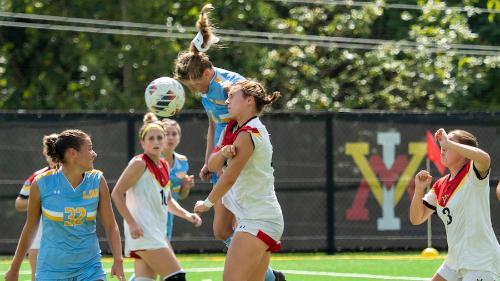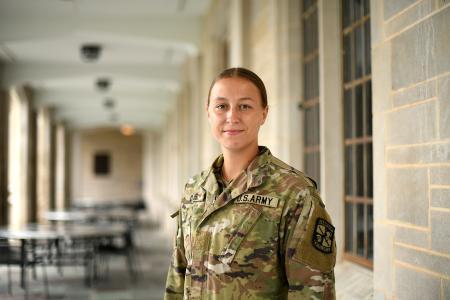Behind the Balance: Audrey Davis ’25 — Keydet Soccer
Virginia Military Institute’s cadet-athletes have to juggle cadet life, heavy academic course loads, and their NCAA Division I sport. Committed to both academic and athletic pursuits, balancing their rigorous schedule in both sports and school requires a certain level of commitment and discipline. Behind the Balance is a series that focuses on those cadet-athletes and how they handle the hurdles of the day-to-day.
LEXINGTON, Va. Nov. 7, 2023 — It’s 5:45 a.m. on a Tuesday. Audrey Davis ’25 is up before the sun to get a workout in. It’s required — she plays center back for the Virginia Military Institute Women’s Soccer Team. They have some sort of workout or practice daily when they are in season, plus games on Sundays and Thursdays.
Her days don’t always start before the crack of dawn. Certain ones call for lifting, rehabilitation, reviewing film, or drills.
On a normal day, while in season, she’s up at 6:45 a.m. so she can be at formation at 7 a.m. where they stand outside and salute the flag. Then it’s breakfast and onto class from 8 a.m. until 2 p.m. After classes, she tries to come down to Paulette Hall to get some rehab work in before practice. Then it’s practice for around two hours.
Then it’s onto dinner.
From there she’s studying for up to four hours and her day just repeats.
“It's a pretty busy day,” she said.
It varies on the intensity of what practices look like. Mondays are rest days — no practice whatsoever. Tuesday requires hardcore training. Then Wednesday is to build up for Thursday’s game. They do recovery training on Friday, ramp-up workouts on Saturday, and then play Sunday.
“We want to have a full week schedule and then during the offseason, we'll train pretty much every day, just some days might be a lighter load,” the international studies major said.
Finding her way to VMI
Davis wasn’t sure what life after college would look like.
“I had no plan for after college and I just started thinking about what I wanted to do with my life. And I’m the type of person that does need that discipline in that structure,” she said.
She initially was thinking of another school and being a biology major. Then she did a soccer camp at Virginia Military Institute with head coach Chris Haught-Thompson.
-439x300.jpg) “He liked me and he said that if I wanted to come here, the spot was mine,” she said.
“He liked me and he said that if I wanted to come here, the spot was mine,” she said.
She wasn’t even going to commission and at first, was looking at the Marines. Once she was at VMI, she received an Army scholarship and everything started to switch into place.
“It was just one of those things where I came here and I realized that I really liked this lifestyle and it's really good for me,” she said.
Balancing studies and sports
Cadet-athletes at VMI not only have their responsibilities with their selected sport but cadet duties on top of that. There are specific times of when they can eat, go to class, study, and sleep. Cadets are also required to take physical fitness classes twice a week, participate in ROTC all four years, require room and uniform inspections, parade preparation, guard duty, and more.
It’s crucial to stay regimented with each activity.
“I've become really productive in class, like staying on task so I don't fall behind or so I don't have to make up anything from class,” Davis said. “A lot of it is just really grinding it out like late at night like we're done with dinner around 8 p.m., so normally I'd stay out from like 8 p.m. to midnight so I get like a good four hours of homework and then I try to get right to bed after that.”
After graduation, she has committed to the U.S. Army for eight years. Her focus, which is undecided at the moment, is wavering between military intelligence and aviation. 
Her commitments to the Army while at VMI include control time weekly at school, Advanced Camp this summer, plus the commitment of eight years after graduation.
When the days are long and tiring — both exhausting mentally and physically — Davis said she can’t give up.
“You don't really have a choice here, you really have to learn that line between giving up and seeing it as adversity and using it to push you,” she said.
She’s seen firsthand overcoming a large obstacle with recently having ankle surgery.
“One of the trainers here told me that if you push through even on your worst days … the next day is going to be better regardless. And I think that applies,” she said. “I started using that for not only soccer, but on the hill. So you really don't have a choice. Because if you mess up one day here you fall behind and you can spend the whole semester trying to recover.”
Laura Peters Shapiro
Communications & Marketing
VIRGINIA MILITARY INSTITUTE
.svg)
.png)
